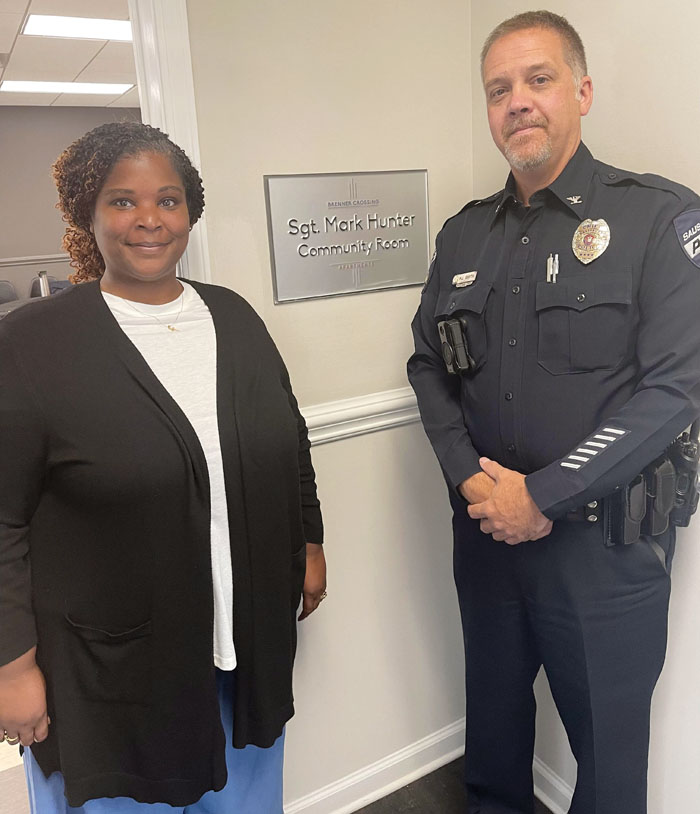Kenneth L. Hardin: Salisbury PD chief and Brenner Crossing manager hold talks
Published 12:00 am Sunday, August 11, 2024

- Brenner Crossing Manager, Denise Barnes, and SPD Chief, P.J. Smith. Kenneth Hardin photo
By Kenneth L. Hardin
It wasn’t on the same level as the 1919 President Woodrow Wilson-led Versailles Peace Talks or the more recent Framework Agreement between the United States and the Kingdom of Saudi Arabia, but so many political leaders across the globe could’ve learned something from a smaller more nondescript tête-à-tête held last Wednesday morning. Salisbury Police Chief P.J. Smith and Brenner Crossing apartments property manager Denise Barnes huddled in an activity room at the complex fittingly named after the late SPD officer Sgt. Mark Hunter.
Unlike the high-stakes pressure of the world stage where insincere obligatory pleasantries are continually exchanged for photo ops without much being accomplished, this was a template for how police community relations should be done. Instead of it being tension filled with both sides displaying reticence and hesitancy born out of media hyped dissension, the meeting felt more like two new acquaintances sitting down and getting to know each other. Chief Smith added, “And finding out how much we have in common.”
Last week, as I was teaching a workshop at the apartment complex to middle and high school students who live there, a concerned resident approached me and asked if I would talk with the Brenner Crossing property manager. I visited Barnes in her office and listened to the issues and concerns she had about recurring crime in and around the complex as well as the need for increased police engagement. She shared that when gun violence and other crimes occur offsite, the perpetrators typically run towards their property and hide in darkened areas out of view of installed cameras.
She added that she was having difficulty reaching the chief through another source, so I called him on his cellphone while we were sitting in our meeting. As he typically does, the chief responded quickly and agreed to meet personally with the property manager and me a week later. After opening the discussion and explaining its purpose, I sat back and became a casual observer to a mutually respectful and productive conversation. I was impressed throughout with the positive tone, the willingness on both sides to collaborate to address issues and concerns, but more importantly the commonalities they shared.
Barnes told of how she was a former resident of the old Civic Park Apartments and after a short time away from the city, she is now back managing the new version. The chief told of growing up in various parts of the city but had spent time as a child visiting friends in the old Civic Park apartments. This connection seemed to remove any air of initial hesitancy and the two moved into a relaxed and cordial conversation from then forward.
Barnes read in her notes that she asked for assistance in having an additional camera and increased lighting installed in a specific area of the complex. The chief provided detailed information on the current 30 cameras already in use there but assured her he would research available funds for the newly requested camera. He took the opportunity to educate Barnes on how the department uses local crime data and relationships with other local law enforcement agencies to determine where to use patrol resources. They both agreed that it was critically important that citizens become more involved in assisting police. As he detailed the process of how to contact his agency, she dutifully took notes to pass on to residents there. The subject of using an open residence as a substation was addressed and negated as officers’ cars are now equipped with sophisticated technology and equipment so their mobile presence would serve better as a deterrent than a fixed residence. The two did agree and discussed offering an apartment free of charge or at a reduced rate to an officer who would live there permanently.
After addressing a few more concerns, the conversation drifted slowly to both their sincere commitment and genuine concern for improving the overall community while simultaneously strengthening the relationship between the different neighborhoods and the department. They both agreed that without mutually respectful partnerships, nothing will succeed. Barnes shared that she has many family members who live in and around the complex which makes building a strong relationship personal for her. The chief provided professional insight on how community policing has changed since the 1970s, “It’s not simply walking the neighborhood anymore. It’s meeting with apartment managers, businesses, faith leaders and places of worship.”
He shared a comment from a youth attendee during a recent SPD listening session held at the Miller Recreation Center. Although there were many positive comments, he said one bothered him deeply because he wants to change the perception of the police in the community. A middle school attendee stated, “You’re not here to engage with us, you’re here to serve and protect. We don’t talk to the police because we may become a target.” With his head bowed and shaking from side to side in obvious disappointment, the chief said this is not what he believes and vows to show that police officers are human, too. He ended by sharing that since he was a child, he always wanted to be a police officer. He added that his favorite show as a kid was CHiPS and while riding his bike, he pretended to be one of the motorcycle officer characters. With head still bowed, he hesitantly admitted, “Now kids don’t trust the police.”
As we wrapped up the discussion and the thank-you pleasantries resumed on both sides, the chief acknowledged that he hadn’t visited the complex since new ownership and management had taken place. He remarked how happy he was that the meeting that morning occurred. I hope others will follow the example the two established so that stronger relationships can evolve.
Kenneth L. (Kenny) Hardin is a member of the National Association of Black Journalists.




